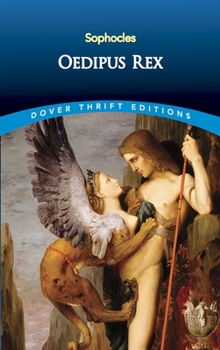Book Overview
Considered by many the greatest of the classic Greek tragedies, Oedipus Rex is Sophocles' finest play and a work of extraordinary power and resonance. Aristotle considered it a masterpiece of dramatic construction and refers to it frequently in the Poetics . In presenting the story of King Oedipus and the tragedy that ensues when he discovers he has inadvertently killed his father and married his mother, the play exhibits near-perfect harmony of character...
Format:Paperback
Language:English
ISBN:0486268772
ISBN13:9780486268774
Release Date:June 1991
Publisher:Dover Publications
Length:64 Pages
Weight:0.15 lbs.
Dimensions:0.2" x 4.9" x 7.8"
Age Range:14 years and up
Grade Range:Grade 9 and higher
Customer Reviews
4 ratings
Great story, great edition
Published by Thriftbooks.com User , 16 years ago
Okay, this is probably one of the most disturbing stories ever written. Maybe that is why I love it so much--it's a horrible, disturbing story that has managed to keep society hooked for eons with its steady of the omnipotience of fate. Because, yes, despite all the glorious incest that all the high schoolers obsess over, this is about fate, a man who is doomed to a horrific life from the moment he is born. On top of this is the basic human emotions and attachments, the attempt of the human will to fight fate. It's a hard battle, but it certainly is a good one to read.
The most read and misread of the ancient Greek tragedies
Published by Thriftbooks.com User , 21 years ago
"Oedipus Tyrannus" ("Oedipus the King") is not only the most read of all the Greek tragedies, it is also the most misread of the Greek dramas. The play's reputation exists in part because it was presented as the paragon of the dramatic form by Aristotle in his "Poetics," and it may well be because of that fact that "Oedipus Tryannus" was one of the relatively few plays by Sophocles to be passed down from ancient times. When I have taught Greek tragedies in various classes students have reconsidered the play in terms of key concepts such as harmartia ("tragic error of judgment"), angonrisis ("recognition"), peripeteia ("reversal"), catharsis, etc., and they usually agree this play provides the proverbial textbook examples of these terms.However, I was always bothered by the fact that Sophocles engages in some rather heavy-handed foreshadowing regarding the fact that the play's tragic hero is going to blind himself before the conclusion. The lines were closer to, dare I say, sophomoric humor than eloquently setting up the climax. But then I read something very, very interesting in Homer's "Iliad," where there appears a single reference to Oedipus which suggests that he died in battle. Remember now that Homer's epics were written several hundred years before Sophocles was born and that the Greek playwrights were allowed to take great liberties with the various myths (consider the three different versions of the death of Clytemnestra at the hands of Orestes we have from Sophocles, Euripides and Aeschylus). The Athenian audience would know its Homer, but "Oedipus Tyrannus" was a new play.This leads me to advance a very interesting possibility: the Greek audience did not know that Oedipus was going to blind himself. This was a new idea. Jocasta (Iocasta) appears in the "Odyssey" when Odysseus visits Hades, but the only mention of the sin involved is in her marriage to her son, nothing about his being blind. Obviously you will have to make your own judgment about my hypotheses, but I have to think it is at least worth consideration. Still, there is the fact that because even those who do not know the play know the story about the man who killed his father and married his mother, "Oedipus Tyrannus" is usually misread by students. Because they know the curse they miss something very important: the curse that the oracle at Delphi tells Oedipus is not the same curse that was told to his parents (you can, to quote Casey Stengel, "look it up"). As in his play "Antigone," where the main character is not the title figure but Creon, Sophocles makes Jocasta more than a mere supporting character in this tragedy.Consequently, while there is no need for me to convince you that "Oedipus Tyrannus" is a great play and the epitome of Greek tragedy, I have hopefully given you a couple of things to consider when next you use this play in class. P.S. You can also play the cherubs Tom Lehrer's song for the movie version of "Oedipus The King." That will broaden their hori
the classic play
Published by Thriftbooks.com User , 24 years ago
this is one of the best plays ever written, as well as one of the earliest. oedipus has become very much a part of our culture, and the oedipus plays should be required reading. fitzgerald and fitts did a wonderful job in the translation.
Oedipus Rex: A Dissertation on Human Behavior
Published by Thriftbooks.com User , 24 years ago
Oedipus Rex is a timeless, masterpiece of a tragedy whose greatness and complexity far transcends the age in which it was written. Sophecles skillfully delves into the depths of human behavior, and discerns an acute knowledge of the components which compromise the human behavior which he is studying. Human desires, the human moral code, and the human sense of remorse are three of the facets of human behavior which Sophocles conveys to us through Oedipus in his rise to power and subsequent demise. Reading Oedipus Rex can not only provide a powerful and extraordinary literary experience, but can also pose an oppurtunity for examination and reflection regarding human behavior at large, and the behavior of one's self. After reading Oedipus, it is not difficult to understand why Aristotle proclaimed Sophocles' epic to be civilization's greatest work.






